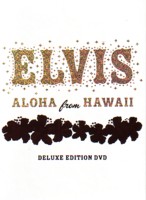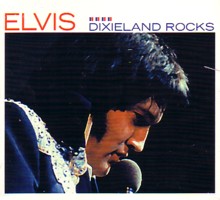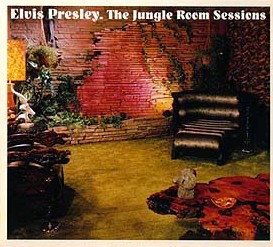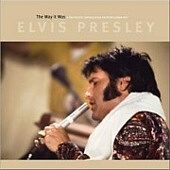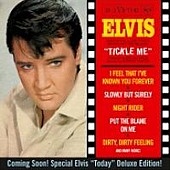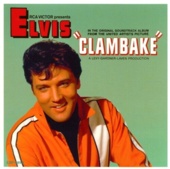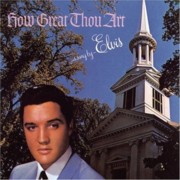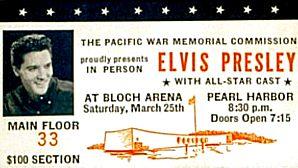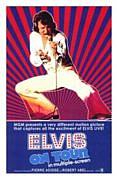Roger Semon Interview
- Roger Semon talks with EIN about new releases, how he met Ernst Jorgensen, the future of FTD, and more..
|
Roger Semon, along with Ernst Jorgensen, is the co-producer of everything Elvis at SONY/BMG.
In fact it was the Roger Semon produced 'E.P. Collection' issued in the UK in the early eighties that spearheaded the fabulous re-packaging of Elvis' musical legacy and eventually led to the creation of the FTD fan club label.
Roger recently took time out of his busy schedule to answer a few questions for us, several of which that have been asked by EIN members concerned about the future of their Elvis project & querying what future releases are on the drawing-board.
(Photo: Ernst Jorgensen with Roger Semon) |
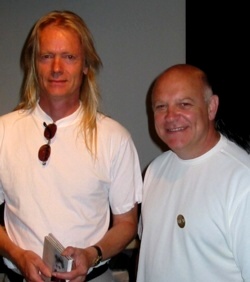 |
The FTD Fan Club label was started back in 1999 with Roger Semon and Ernst Jorgensen at the helm. With an original schedule of only 4 CD releases a year the company has grown producing ten releases a year, including some impressive book and CD packages. Ernst Jorgensen is often seen as the mouthpiece of the organisation yet Roger Semon works diligently behind the scenes and is credited as co-producer on all releases. FTD is a sideline however to their full-time work for BMG with the mainstream releases.
EIN has received several questions about FTD's future as well as Roger Semon's work, and we are delighted that Roger has agreed to answer a few of them for us.
Interview by EIN vice-president Piers Beagley.
EIN -
The last time we met was back in 2002 at the FTD conference. At the time you had released 18 CDs including your first "That's The Way It Was" book. Just 4 years later you have moved on to the 'Classic Albums' series and have released 60 FTDs. What has been your most satisfying achievements with the label and are you and Ernst basking in your success?
Roger Semon– My most satisfying achievement is to have started the label for Sony BMG in the
first place. Ernst and I were in a unique situation, as we both had played
senior executive roles at RCA/BMG for many years. This undoubtedly gave us both
a business credential that went way beyond our Elvis expertise. Fortunately,
Sony BMG is blessed with extremely forward thinking players who are prepared to
think outside of the box. The idea was radical and they embraced it
fully.
From a release perspective, I get a buzz from certain titles for different reasons. This can range from "Jungle Room Sessions" for improving so dramatically what went before and for "Tickle Me" as Ernst thought I was nuts even suggesting it - now he’s seen the light!
EIN - The last few releases (His Hand In Mine, Writing For The King, Let Yourself Go) have been some of FTD's very best. Do you realise that FTD has already released more Elvis material than was issued in his lifetime!
RS- I had no idea. It’s frightening that someone is even counting! Truth is, we aim for every release to be special but so much depends on where it sits in a ‘fans’ head. Musically we all have preferences. Unreleased performances will always be a priority for most. Sometimes outtakes aren’t in abundance but we still think its’ worthy to upgrade what went before. Some could argue why bother with "Clambake". Well, I got a tremendous kick from redoing what many may consider pointless! The photos are truly exceptional and it leaves one wondering why they were never used in the first place. Locating the original album transparency is a truly satisfying experience for me because it certainly didn’t reside in a file marked "Clambake" within Sony BMG’s archive!
Above - The amazing diversity of the FTD label.
EIN - I remember being so excited when the English 'E.P Collection' was released in, was it 1982?. Was that your first project with regard to Elvis? Had you started working with Ernst by then?
RS – I didn’t know Ernst back then although the teamwork had theoretically began because his recording session book was a revelation to me at the time. I’d moved into RCA’s head office in 1980 and was managing the national sales promotion team. It didn’t take long for me to muscle in on the Elvis reissue game! Elvis’ extended plays always fascinated me and it seemed a good idea at the time! It certainly put me on the map with Elvis fans throughout the world. I remember travelling to New York for the first time in 1984 and being truly flattered when I saw it on display in a cool record store on Broadway.
EIN - So, how and when did you and Ernst meet and how did you convince BMG that you could be a team who could repackage and remarket Elvis' releases?
RS – Ernst and I first met in 1985 at the BMG London office. BMG International didn’t take much persuasion actually. I had already gained notoriety from my releases and the senior executive who recruited Ernst as the Managing Director for Denmark already knew about his exceptional Elvis knowledge. We’d had both teamed up before this anyway and were well into developing "Essential Elvis", our first combined production. Our big task was to convince BMG in the U.S., as the repertoire owner, that we could do an extraordinary job for them if given the mandate.
EIN - So was that first release of yours and Ernst's the one that made BMG realise that this would be a profitable investment for them?
RS – It was "Essential Elvis". The release challenged everything that went before. It took Elvis out of the sale bin. The packaging, price and content were truly revolutionary at the time. No one at BMG really cared about Elvis (product wise) around this time – his catalogue had been used and abused. Fortunately for us, U.K. exports flooded into the U.S. market due to unprecedented demand and this resulted in BMG U.S. releasing it locally. For the first time, albeit with a slight name change, RCA in the U.S. issued a U.K. originated Elvis album. The rest is history.
(Right: The Elvis CD that changed it all) |
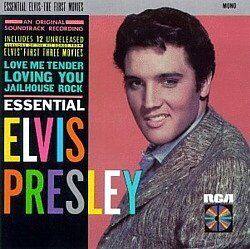 |
EIN - I believe that you are also CEO or head of the Castle/Sanctuary label in England. Is this still true, what's your work with them nowadays? How does this fit in with FTD/BMG?
RS – I’m actually COO for Sanctuary Records Group. In simplistic terms I ensure that the company’s recorded assets are managed and mined to more or less the same high standards applied to Elvis’ legacy. This ranges from Back Sabbath to the Kinks and Morrissey. I have to make sure we do it profitably of course.
EIN - How do you and Ernst divide your time between working for BMG and the mainstream releases and running the FTD label?
RS – Well, I don’t think we create any specific divide. While researching, we can be securing components or information for any number of releases. It all easily merges. It’s not practical to measure it by days although it’s fair to say that Sony BMG’s need is always given priority.
EIN - Of your mainstream releases I was particularly impressed by the wonderful 'Close Up' box-set. After the fabulous success of 'Platinum' box-set were the sales of 'Close Up' and the 'Today, Tomorrow and Forever' as high as hoped for?
RS – I am proud of these releases. Some may accuse Sony BMG of dressing up the same old repertoire in the same old way but I think these releases do it gracefully. As producers, we endeavour to create different audio and visual experiences from material that obviously can appear repetitive. I can only judge it from my perspective and each release, regardless of rarities, provides even me with hours of enjoyment, after all, Elvis isn’t in the studio anymore.
Sales on "Close Up" and "Today, Tomorrow & Forever" are around 25.000 and 100.000 respectively – that’s U.S. only numbers.
EIN - I am surprised that EPE have made no announcements regarding major CD releases for this anniversary year. Are we to believe that there is no box-set coming out this year? Surely this will be the last major publicity fuelled year, so are there any other major releases planned?
RS – That ‘s for Sony BMG to announce, and there is no announcement yet.
EIN - Before Christmas you announced that 2006 would be the year where you would finally be running out of studio outtakes. A lot of fans have written to us very concerned that FTD may run out of overall "big-selling" material and that the end might be in sight. Can you comment on how many more years you are thinking of for FTD?
RS – I’m not thinking of it in that way. I remember RCA saying in 1977 that there were no unreleased Elvis performances left for release. It’s fair to say that we’re a long way down the wire from there. FTD will exist for as long as Ernst and I have the desire to be creative and continue working. If the day ever comes when there is nothing left to do then it’s on to Elvis impersonators!
EIN - Do you and Ernst have a free-hand in what is released on FTD as long as you present BMG/SONY will a healthy profit - or do you have a set budget and release limitations? The 'Writing For the King' issue was obviously a huge project to complete for a very narrow market.
RS – We concentrate on things that we feel need to be documented. It’s fair to say that profit is always needed to maintain solvency but our margins are regularly compromised by our desire to make our releases special. Despite what some may think, we do this because we are Elvis fans too.
EIN - Elvis fans themselves do not have an unlimited budget so can you explain your policy of putting out 10 releases a year (including an expensive book) rather than the previous more affordable schedule? And are the sale numbers the same, no matter how many you release at a time?
RS – I’ve never thought about the number of releases. I assume fans will buy what they can afford and be selective anyway. "Clambake" isn’t to everyone’s taste! Also, the bootleggers don’t seem to concern themselves with this either? Numbers can vary but all seem to follow a pattern over a period of 2-3 years.
EIN - Is it true that live concert soundboards sell many more than FTD's of Studio outtakes? How are the Classic Album series selling? What about the more expensive projects like 'Rockin Across Texas' and 'Writing For The King' - do they sell well?
RS – There is specific logic to sales figures, but the more expensive book projects sell less than the others.
EIN - The new era of iPods and downloads have really hurt CD sales in the last few years, which I personally find very distressing. Have you had any discussions about FTD releases being downloadable? I guess the fans would at last have to stop complaining about the sleeve notes!!
RS – No, in a word. It may be that full album downloads become part of future strategy but it’s certainly not been discussed yet.
EIN - The past few FTD releases have credited both you and Ernst for Art Design. I would like to say that compared to the early days the FTD designs have recently got better and better. Has there been a change in design policy, are you more involved in the final product?
(EIN Note - See our interview with Chris Lambeth from Peacock designs)
RS – We’ve both always been involved with the creative process. I just felt it should be noted. There has been no concerted effort to change things. It’s down to what’s available at the time and whether Chris inspires us all. Having done Elvis art for 25 years, I still feel the need to be unpredictable sometimes. I know that the cover of "Unchained Melody" isn’t exactly what people expected but why is it so bad, every now and again, to show Elvis as he was especially between fans? He doesn’t look like he did in the ’68 Comeback Special but he’s smiling and it’s real - not cosmetic.
(Right: Unchained Melody)
|
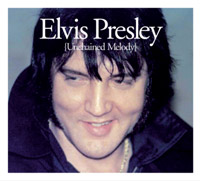 |
EIN - I think many fans do not realise that FTD has to get authorisation for all the memorabilia and photos you use, whereas illegal Bootlegs copy photos from anyone and everywhere. What do you feel when you see fans putting down your releases and praising the Bootleg designs?
RS – Anyone can have a platform and say what they like these days with the Internet. For the most part, constructive criticism is helpful and that’s a healthy thing. Unfortunately, it also allows vindictive individuals to have equal say. Bootlegs are cool to praise, they always have been no matter what artist is involved, but they are produced with absolutely no conscience or constraint over rights ownership. I’m content knowing that the majority appreciate what FTD sets out to achieve.
EIN - I'm looking forward to your April FTD releases including the Deluxe '50 Million Elvis Fans Can't Be Wrong.' With the 50 year copyright law eating into Elvis' legacy there must be real pressure to do these 1957/1958 upgrades as soon as possible. Are Jailhouse Rock and King Creole Deluxe Soundtrack upgrades going to happen soon?
RS – We have one eye on this and it accelerated the upgrading of "Elvis Presley". However, it’s only the original masters as released then (50 years ago) that become PD. Sony BMG has recently successfully stopped several companies who made the fundamental mistake of using masters not released until the ‘70s or later. "Jailhouse Rock" is planned.
(Right: 'Jailhouse Rock' - something to look forward to)
|
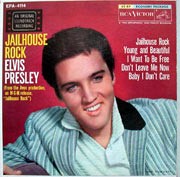 |
EIN - Is it upsetting for you to see other companies jumping onto the back of your RCA legacy and swamping the market with sub-standard SUN and Elvis 1956 releases? In the record stores these can sadly lower the publicity profile of the genuine BMG upgrades?
RS - Of course but this is an issue for Sony BMG. The PD law is what it is and it's up to Sony BMG to remain competitive by way of pricing. They have had competition for years with the Louisiana Hayride recordings. I am a firm believer that most discernable consumers will want Elvis on RCA not 'cheapo-cheapo' rip off records. Bottom trawler consumers will always by duff budget CD's so they aren't likely to buy an RCA Elvis CD anyway. For this reason, I don't think it will affect Sony BMG too adversely.
EIN - Many fans are upset by the never-ending recycling of Elvis product. I was pleasantly surprised, actually really surprised, how well the recent mid-price Elvis GENRE CDs worked. In particular got a kick from 'Elvis LIVE' and really enjoyed 'Elvis R&B'. How did these sell, were they the commercial success you hoped for?
RS - We were concerned at the outset as they didn't exactly receive great acclaim or sales. However, they have now exceeded expectation in the U.S. They were really done to offer simplistic introductions to consumers who don't necessarily have an Elvis album. They are not really aimed at FTD collectors so they should just stay clear.
EIN - With "cutting the catalogue" and trying to get Elvis' musical legacy in order, it seems strange to put out the CAMDEN cheapo CD re-releases in the same period. Were do you fit into organising these Mainstream release schedules?
RS – We are consulted of course and offer constructive input. Funny enough, I’ve been against the issue of these somewhat questionable albums for ages but I have to say I changed my mind last year. For me now, despite dubious creativity, they still have a role in completing the original release legacy. I’m sure if most of us were honest, we’d admit that we even played these albums to death when they first came out, especially "Flaming Star". We deliberately didn’t add bonus tracks as this would have made their reissue even more suspect. They were specifically issued by Sony BMG’s budget division which mainly targets non-traditional accounts rather than mainstream outlets.
(Right: Original Flaming Star LP) |
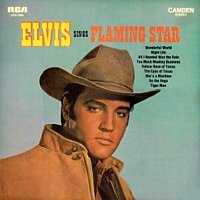 |
EIN - If Ernst is described as the Elvis "Headhunter" in your project, how would you describe your job? And is Joe DiMuro still your boss?
RS – I would describe it as "Commercial and Creative". It would be pointless if we had the same skill sets. Joe has left Sony BMG. Our boss is Matt Stringer.
EIN - Fans may not know that you started with RCA as a salesman and then Marketing Manager. Also, I won't mention you being lead singer in various bands like 'The In-Sekt' and punk band 'Horrorcomic'. I always felt it was a little hard to be an Elvis fan during the punk era. Were you always an Elvis fanatic? And did seeing English bands like 'The Small Faces' change your life?
RS – I embraced Elvis’ music from a very early age and he will always be the one who influences me most. I joined a band while still at school in the ‘60s. However, apart from the Merseybeat boom, I quickly discovered the magic of Motown and Stax. I’ve always found it easy to embrace all different genre. It is a simple case of ‘whatever turns you on’. In the mid to late ‘60s, seeing bands live like the Who and Small Faces at the Marquee club in London was the most exciting experience I’d known. I don’t think I was alone! However, during this time I would still be waiting for the shop to open so I could by "Girl Happy" or whatever LP it was at the time.
EIN - Fans have been asking whether there is a "Nashville 1971" FTD planned or perhaps you are saving these outtakes for future 'Classic Album' upgrades?
RS – We will cover all material, one way or another, and doesn’t make sense to get into specifics until we have made a final decision.
Above: Three possible future FTD/BMG projects.
EIN - In the past the following possible future CDs have been mentioned a) A December 1976 show, b) The 1961 Hawaiian concert, c) How Great Thou Art, d) The 'On Tour' project now surely that must be soon?
RS – There is always a lot of rumours. Sometimes they are true.
EIN - It is very disappointing that fellow Aussie Bruce Jackson (Elvis audio engineer) doesn't want to hand over any of his soundboards. Have you had any more communication with him recently to give us hope?
RS – Bruce Jackson has told Ernst he doesn’t have any. Others have told us differently. We can’t force the man to cooperate.
EIN - In all your years researching and discovering Elvis hidden treasures what has been the most exciting experience for you?
RS – Finding the "Shake, Rattle and Roll" and Lawdy, Miss Clawdy outtakes at the RCA Studios in New York after Ernst had left to go home!
EIN - Do you still keep a careful eye on Bootleg Elvis material coming out? If so I am sure you are aware of the recent Bootleg releases compiling all of Elvis' 1969 American Studio sessions. Your fabulous FTD 'Memphis Sessions' as well as the BMG 'Suspicious Minds' made a good dent in the unreleased material but I'm sure FTD buyers would love to hear even more of these sessions, especially as the bootlegs are in mono. Do you have any plans?
RS – We don’t have to because certain Elvis fans send us full reports.
EIN - Talking of famous Bootlegs, Elvis' 1974 Vegas rehearsal and 1974 Opening Show makes a sensational combination. We know that you have the original rehearsal cassette from Ed Bonja, for the 'Twelfth Of Never' release. With an audio upgrade surely this would make a great double FTD. Is this or other famous bootlegs ever going to get official FTD release?
RS – There are many good ideas around, including this one.
EIN - Do you have time to peruse the Elvis message-boards and are you hurt when you read negative comments about what you achieve for Elvis fans?
RS – I don’t look at these. I believe that a very small minority have a hidden agenda and spend all day looking for reasons to slag us and Sony BMG off. For those who don’t, perhaps it would be more constructive to email Ernst and I.
EIN - Personally I think FTD does a sensational job and I know how hard it is to please everyone. Thanks so much for the interview and thanks for all your hard work, we all wish you well and hope that FTD continues for a very very long time.
RS -
Well, thanks for that.
|



